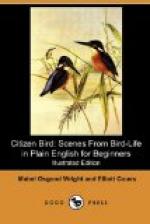“How did you know that Robin from all the others?” asked Dodo.
“He had lost the two longest quills out of his right wing, and so he flew sort of lop-sided,” said Rap readily. “As soon as he began the others came down and just gobbled; in two minutes all the berries were gone, but the birds stayed round all the same, hinting for more. We hadn’t many berries left, so mother said, ‘Try if they will eat meal.’ I mixed some meal in a pan with hot water and spread it in little puddles on the snow. The Robins acted real mad at first, because it wasn’t berries, but after a while one pecked at it and told the others it was all right, and then thirty Robins all sat in a row and ate that meal up, the same as if they were chickens.” Here Rap paused and laughed at the thought of the strange sight.
“Pretty soon after that the snow melted, and by April Robins were building around in our yard, in the maples by the road, and all through this orchard. One day I noticed some little twigs and a splash of mud on our back steps, and when I looked up I saw that something was building a nest in the crotch of the old grape vine. ’That’s a queer place for a nest,’ I said to myself, ’not a leaf on the vine and my window right on top. I wonder what silly bird is doing it.’
“Flap, and my Robin with the broken feathers came along with his mouth full of sticks; but when he saw me he dropped them and went over on the clothes-pole, and called and scolded like everything. Then I went up to my window and looked through the blind slats. Next day the nest was done. It wasn’t a pretty nest—Robins’ never are. They are heavy and lumpy, and often fall off the branches when a long rain wets them. This one seemed quite comfortable inside, and was lined with soft grass.
“Mrs. Robin looked like her husband, but I could tell the difference; for she didn’t sit in the pines and sing, and her breast wasn’t so red. When the nest was done, she laid a beautiful egg every day until there were four, and then one or the other of the birds sat on the eggs all the time. Robins’ eggs are a queer color—not just blue or quite green, but something between, all of their own.”




